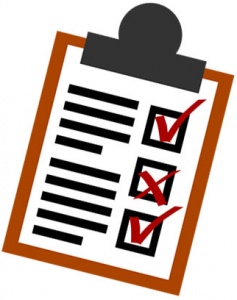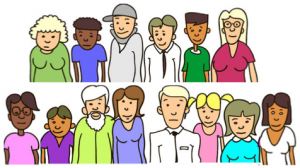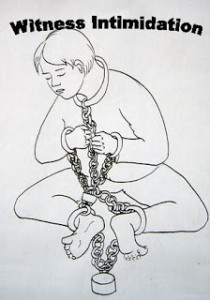Introduction to Eyewitness Evidence
 How do historians use eyewitness testimony to uncover the past?
How do historians use eyewitness testimony to uncover the past?
Historians find out about the past the same way all of us find out about something we did not personally observe or experience. They seek out information from those people who witnessed and experienced the event. We call them eyewitnesses. We access their eyewitness information by reading their accounts in newspapers, magazines, books, letters, or other documents. When possible we talk to the eyewitnesses directly, or listen to what they tell other people like investigators and journalists on television, radio, or the Internet.
 We know that this is also how detectives investigate crimes. They look for eyewitnesses, interview them, and carefully record what they say. Eyewitnesses are key to any investigation. Eyewitness testimony, as we know, is considered to be some of the most important evidence in any investigation. When uncovering the past, historians act a lot like detectives investigating a crime. When possible, they reconstruct what happened using what eyewitnesses have said. For many historians, especially those studying events in the ancient past, the people who witnessed the events or knew the historical figure in question are not alive to directly give their accounts. Instead, historians look for written accounts from eyewitnesses and use them the same way detectives and investigative journalists would use oral accounts from living eyewitnesses.
We know that this is also how detectives investigate crimes. They look for eyewitnesses, interview them, and carefully record what they say. Eyewitnesses are key to any investigation. Eyewitness testimony, as we know, is considered to be some of the most important evidence in any investigation. When uncovering the past, historians act a lot like detectives investigating a crime. When possible, they reconstruct what happened using what eyewitnesses have said. For many historians, especially those studying events in the ancient past, the people who witnessed the events or knew the historical figure in question are not alive to directly give their accounts. Instead, historians look for written accounts from eyewitnesses and use them the same way detectives and investigative journalists would use oral accounts from living eyewitnesses.
But, is all eyewitness testimony reliable?
We know that not all eyewitness testimony is factually correct and so do detectives, journalists, and historians. To deal with the issue of reliability, historians and detectives use guidelines (in fact very similar guidelines) to determine the reliability of eyewitness information and how to use it to reconstruct past events. Let’s look at some of the guidelines.
Guidelines Used by Detectives and Historians
 Detectives and historians ask a series of questions to determine the reliability of eyewitness testimony. So do investigative journalists and attorneys. You can summarize their questions into the following five:
Detectives and historians ask a series of questions to determine the reliability of eyewitness testimony. So do investigative journalists and attorneys. You can summarize their questions into the following five:
1. Were the eyewitnesses actually present and in a position to observe the event?
2. Has a short period of time elapsed between the event and the eyewitness account?
3. Are the accounts of multiple eyewitnesses similar with some expected differences?
4. Does the eyewitness stand to gain something from making up a false account?
5. Does making the account embarrass, cause discomfort to, endanger, or in any way work against the interests of the eyewitness?
Let’s look at each of these questions in more detail.
1. Were the eyewitnesses actually present and in a position to observe the event?
The importance of this question is easy to see. If someone was not present or in a position to see an event, they could not have been an eyewitness to it. This doesn’t mean that their account is necessarily untrue. It means THEY did not observe it. They may have heard about it from someone else, but it is not eyewitness testimony because they did not witness it themselves. An account dictated to someone by another person and faithfully recorded can still be considered eyewitness evidence. But the accuracy of the recorded account has to be established before it can be considered reliable eyewitness testimony.
For example if an eyewitness gives their account to a detective who has it transcribed or recorded as it is being told, this written or recorded account is still eyewitness testimony. In contrast if a person overhears or is casually told something by an eyewitness and does not faithfully and accurately record or transcribe exactly what is being said, that testimony becomes hear-say evidence and is not admissible in most courts of law.
2. Has a short period of time elapsed between the event and the eyewitness account?
The importance of this question is also easy to understand. The amount of time between something a person observes and their account of what happened affects how clearly they remember it. In  general an eyewitness accounts is more reliable if it is given closer to when the event happened.
general an eyewitness accounts is more reliable if it is given closer to when the event happened.
Now there are several things to consider when asking this question. How close to the event is close enough? The answer is that it depends on the circumstances. Some events stand out in a person’s memory because they are significant to them. For example the death of a loved one or a famous person often stands out in memory for years later. Most people were able to remember exactly what they were doing when they heard that President Kennedy had been shot decades after the event. People remembered it until they day they themselves died. Most people can tell you exactly where they were when they heard about the 9/11 attack on the World Trade Center. People remember exactly what happened on their wedding day, high school graduation, and births of their children. People usually remember life-changing or traumatic events for the rest of their lives. So, if an eyewitness is describing something that had a high significance to them, the elapsed time may not be as important as it would be for common day-to-day experiences.
3. Are the accounts of multiple eyewitnesses similar with some expected differences?
Historians and detectives would always consider it better to have multiple eyewitnesses than only one. It is not difficult to understand why this is so. An event that was witnessed by hundreds or thousands of people and then reported by them has a lot more reliability than an event that was witnessed and reported by only one person. Again that does not mean that the one eyewitness is incorrect. It means that having other witnesses helps corroborate that witnesses’ account.
But multiple eyewitnesses can also present some difficulties in an investigation. What happens if their accounts do not agree? The answer to this  may be somewhat surprising. Historians, like detectives do not expect the accounts of eyewitnesses to agree completely. In fact if they do, this is an indication that the eyewitnesses may have talked among themselves and created a story to tell.
may be somewhat surprising. Historians, like detectives do not expect the accounts of eyewitnesses to agree completely. In fact if they do, this is an indication that the eyewitnesses may have talked among themselves and created a story to tell.
When multiple eyewitness accounts agree identically, it means their accounts are less reliable. Why is that so? If you think about it, no two people will see all of an event in exactly the same way. They may have been in slightly different locations. They had different perspectives. They have different biases. Investigators, detectives, and historians expect these differences and consider them indicators of the reliability of eyewitness testimony.
But there should also be similarities between multiple accounts. If one person reports that a blue car ran over a road sign and kept going, then another person reports that a black car ran over the road sign and kept going the similarity in the accounts tells an investigator that a car did run over a road sign. The eyewitness accounts, though not identical, are similar enough to provide evidence that the road sign was not knocked down because it was struck by lightning.
4. Does the eyewitness stand to gain something from making up a false account?
Investigators realize that when an eyewitness benefits from giving an account, there is reason to be suspicious of that account. For example if a person is a suspect in a crime and says they were an eyewitness to someone  else committing that crime, their testimony is going to be regarded with some suspicion. That eyewitness may be telling the truth, but a detective would have to consider the fact that this witness has a great deal to gain from giving a false account. The same is true of a spouse who gives an eyewitness account that helps prove their husband or wife is innocent of a crime. The spouse may be telling the truth, but their eyewitness testimony is less reliable.
else committing that crime, their testimony is going to be regarded with some suspicion. That eyewitness may be telling the truth, but a detective would have to consider the fact that this witness has a great deal to gain from giving a false account. The same is true of a spouse who gives an eyewitness account that helps prove their husband or wife is innocent of a crime. The spouse may be telling the truth, but their eyewitness testimony is less reliable.
Financial gain is also a reason for suspicion. If an eyewitness gives an initial account, changes it, and then suddenly receives a large sum of money from an undisclosed source, an investigator might rightfully wonder whether or not that witness had been paid to change their testimony.
Gaining fame, power, and attention can also be reasons to give false eyewitness testimony. There are many famous examples of people who received pulitzer prizes, political office, starring roles in television or movies, or tremendous media attention based on fictional accounts they invented.
So, an eyewitness receiving personal gain from their testimony is something an investigator and historian look at critically.
5. Does making the account embarrass, cause discomfort to, endanger, or in any way work against the interests of the eyewitness?
On the other hand, experiencing harm , loss, embarrassment, or suffering because of an eyewitness account is very strong evidence of its reliability. If an eyewitness suffers  for making an account and still holds to their story, that account has a high degree of reliability.
for making an account and still holds to their story, that account has a high degree of reliability.
Investigators, detectives, and historians look for whether the eyewitness was embarrassed by their account. Did it weaken their position? Did they receive physical and emotional abuse for giving the account? Were they threatened and/or killed for making their account? When eyewitnesses suffer for their testimony, their accounts become that much more reliable. Similarly, when eyewitnesses look foolish, lose power, position, and status, or are embarrassed by their accounts, that too makes their accounts more reliable. This make sense because it is highly unlikely that a witness would invent and then promote a false story that would cause them embarrassment, pain, loss, or suffering.
